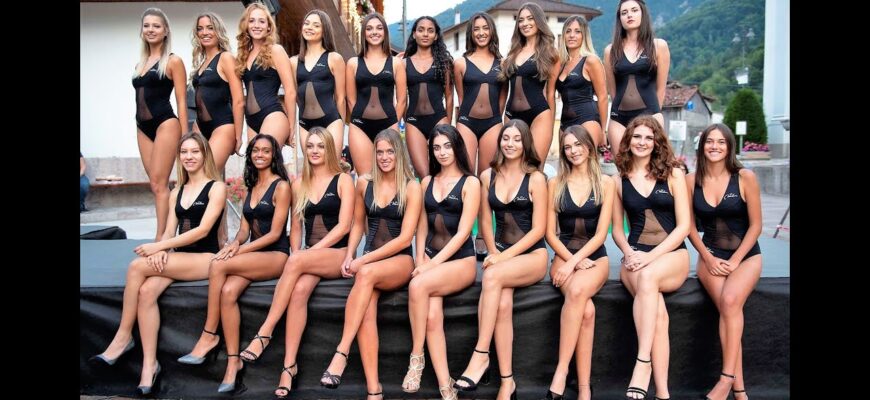A beauty queen`s journey halted by a collision of traditional regulations and the unpredictable nature of the internet.
The glittering stage of Miss Italia, a competition steeped in tradition and conservative elegance, is currently overshadowed by a decidedly modern controversy. Vanessa Zeneli, a 25-year-old model from Udine and a finalist for Miss Friuli-Venezia Giulia, has been abruptly disqualified from the national pageant. The reason? Allegations of her having posted nude photographs on OnlyFans, a subscription-based content platform primarily known for adult material. This incident has not only cast a shadow over Zeneli`s aspirations but also ignited a broader debate about personal privacy, digital footprints, and the evolving standards expected of public figures in the internet age.
The Ironclad Rulebook Meets the Information Age
At the heart of the dispute lies Article 8 of the Miss Italia regulations, a clause as rigid as the traditional values it seeks to uphold. This rule explicitly forbids candidates from maintaining profiles on websites, such as OnlyFans, that feature adult content. For the organizers, the line is clear: a beauty queen`s public image must remain untainted by such associations. Patrizia Mirigliani, the daughter of the pageant`s historical patron, Enzo Mirigliani, has reiterated this stance, emphasizing the need for contestants to possess a “serious curriculum” fitting for a national titleholder. It`s a sentiment that, while understandable within the framework of a conservative beauty contest, feels almost quaint in a world where personal boundaries are constantly blurred by social media.
Zeneli`s Defense: A Stalker`s Shadow and a Digital Betrayal?
However, Vanessa Zeneli`s account paints a far more complex and troubling picture than a simple rule infraction. She claims to be the victim of a malicious stalker who allegedly uploaded her previously taken nude photographs to adult content sites without her consent, subsequently reporting her to the pageant organizers. Zeneli asserts that the regional organizer, Paola Rizzotti, was aware of her past modeling work involving nude photos, yet still welcomed her into the competition.
“I don`t know how he did it,” Zeneli reportedly stated, “but probably this person took my shots and moved them to those adult sites. This individual had been following me for a long time: he was very attentive to what I was doing, who I was dating, who my boyfriend is.”
This narrative, if true, transforms the incident from a straightforward disqualification into a deeply personal ordeal involving privacy violations and cyberstalking. Zeneli has publicly announced her intention to press charges against the alleged perpetrator, seeking justice for what she describes as a deliberate act of sabotage.
The Pageant`s Official Stance: Rules, Reputation, and Regret
Patrizia Mirigliani, while expressing regret over the entire situation, maintains a firm stance on the pageant`s regulations. She clarified that the notification regarding Zeneli`s photos came from her own collaborators, not directly from any “stalker,” suggesting that the internal review process independently flagged the alleged violations. Mirigliani`s comments underscore the pageant`s commitment to its image and rules:
“We want to handle this case with a certain discretion more to protect the girls than for the competition itself, which is serious and has rules to respect. The fact is that these young women have a life ahead of them; they cannot want everything immediately, but must seek a suitable path for their future. I am truly sorry for the entire affair, but I believe that each of them, when entering the professional world, must have a serious curriculum. One can make mistakes, certainly, but one cannot continue to do so.”
This statement, while seemingly empathetic, also subtly places the onus of responsibility on the contestant for her past actions, even if those actions were allegedly misappropriated by a third party. It highlights the often-unforgiving nature of public scrutiny, especially for women in highly visible roles.
A Suspicious Email and Lingering Questions
Adding another layer of intrigue to the saga, Armando Casalino, the organizer of Miss Trieste, did report receiving a suspicious email. This email, he described, contained links to “retouched photos” and explicitly stated that the sender had already reported Vanessa to Miss Italia and Miss Friuli, claiming she would not pass the selections. This detail lends a degree of credence to Zeneli`s stalker claim, at least concerning the method of reporting, even if Mirigliani`s team did not receive it directly.
The incident leaves several questions hanging: Was Vanessa Zeneli a naive participant who genuinely believed her past was irrelevant, or a victim whose private life was weaponized against her? Is Miss Italia`s rulebook an outdated relic, or a necessary safeguard for its brand? In an era where digital footprints are indelible and privacy is increasingly elusive, the line between personal choices and public perception has never been more blurred. This “Miss Italia Digital Dilemma” serves as a poignant reminder that even the most traditional institutions are not immune to the complexities and controversies of the internet age.











